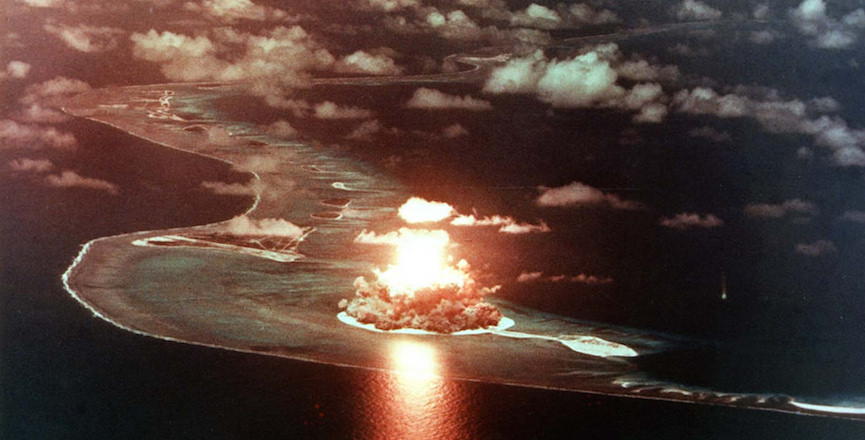It’s official. Canada is now a hawk when it comes to the proliferation of nuclear arms. If any additional confirmation were needed, it was Canada’s absence at last week’s UN vote to ban nuclear weapons. But for those who have been following this file, this is only the latest of Canada’s hawkish gestures.
Canada’s failure to step up for last week’s nuclear weapons ban was criticized from many corners. “It’s shocking that Canada is not going to participate,” asserted former Canadian ambassador for disarmament, Douglas Roche back in March. Paul Meyer, another former Canadian ambassador for disarmament described Canada’s absence as “pathetic.” Project Ploughshares’ executive director Cesar Jaramillo considered it a hypocritical contradiction of the Trudeau government’s stated commitment to multilateralism.
But to understand how hawkish Canada has become on nuclear arms, it’s important to understand the origins of last week’s UN nuclear ban conference: origins that date back to 1970, when the international Nuclear Nonproliferation Treaty (NPT) entered into force. The NPT included two key premises: 1) that non-nuclear-weapon states would not seek weapons, and 2) that nuclear-weapon states would pursue nuclear disarmament aimed at the ultimate elimination of their nuclear arsenals.
Since the 1970s, while the non-nuclear-weapon states have largely respected their obligation, the nuclear-weapon states have not. After decades fuming under this status quo, many countries began to view the NPT as “a conspiracy of the nuclear ‘haves’ to keep the nuclear ‘have-nots’ in their place.” Many also pointed out that countries who defied the NPT and developed nuclear weapons — notably India, Pakistan and Israel — did not pay a price for their non-compliance.
As early as 1974, concerned by Israel’s development of nuclear weapons and its failure to sign onto the NPT, Egypt led an effort to pass a UN resolution calling for a nuclear-weapons-free Middle East. By 1995, the call had been elevated to the NPT review conferences which occur every five years, but the NPT’s depositary states (the US, the UK and Russia) still failed to act.
With pressure mounting, the NPT depositary states finally agreed in 2010 to a compromise with Egypt and its NPT allies: if member states would pass resolutions for stricter non-proliferation measures, the West promised to hold a conference in 2012 supporting nuclear disarmament in the Middle East. But two years later, the West reneged again on its promise and no follow-up conference took place.
Again in 2015, Egypt and non-aligned states tried to launch a process to negotiate a nuclear-free Middle East, and again they were blocked, this time by Canada, acting in concert with the U.S. and the U.K. Following the vote, Canadian PM Stephen Harper and U.S. Secretary of State John Kerry both received personal thanks from Benjamin Netanyahu for sticking their necks out to protect Israel.
Incensed by the 2015 vote and the previous 40 years of inaction, countries opposing nuclear weapons passed a resolution at the UN last October calling for negotiations on a new treaty that would outright ban nuclear weapons. Canada again opposed that resolution, and then boycotted the resulting conference which concluded last week. As a result, Canada had no role in perhaps the most significant development in nuclear disarmament in 20 years: a legally binding ban on nuclear weapons. The treaty was signed by over 120 nations — two-thirds of the world’s countries — and outlaws the development, testing, production, and acquisition of nuclear weapons.
Following Canada’s nay vote last October at the UN, then foreign affairs minister Stéphane Dion argued that Canada’s support for a parallel resolution banning the trade in nuclear bomb-making (a.k.a. “fissile”) material was a more pragmatic course of action. But Meyer points out that the treaty on fissile material has been around since 1993, and has yielded little in terms of results. What’s more, he adds, support for the ban on fissile material need not preclude support for the nuclear ban.
Few Canadians believe that our communities would be safer with more personal firearms. In the same way, at a global level, Canada’s refusal to push for nuclear disarmament on the world stage is perplexing and upsetting. And North Korea’s ability to develop a nuclear arsenal belies any suggestion that the arms of existing nuclear powers serves as any deterrent.
Some have suggested that Canada was strong-armed into opposing the ban by a dictate from the US to its NATO allies. But when challenged in Parliament, Foreign Affairs Minister Chrystia Freeland tiptoed around the question. Whether that were the government’s reasoning or not, Peggy Mason of the Rideau Institute dismisses it as a justification. Citing her own role as Canadian representative to the UN for five years, Mason asserted that NATO membership had never previously been a factor in Canada’s UN voting on disarmament.
Critics of the new ban suggest that it will be ineffective because none of the nuclear powers have signed on. But regardless of such arguments, the new ban sheds light on the nuclear powers’ decades-long reluctance to act on disarmament. Much of the power of international law resides in its ability to confer or withhold legitimacy on international players. With the new ban, Canada, the U.S., the U.K. and their supporters come out looking badly.
Of course, as nuclear powers, one could presume that the U.S. and the U.K. are simply acting in their own self-interest. As a nuclear weapon “have-not,” Canada simply looks foolish.
Thomas Woodley is president of Canadians for Justice and Peace in the Middle East (CJPME), a Canadian non-profit whose mission is to empower Canadians of all backgrounds to promote justice, development and peace in the Middle East.
Image: Flickr/International Campaign to Abolish Nuclear Weapons
Like this article? Please chip in to keep stories like these coming.




